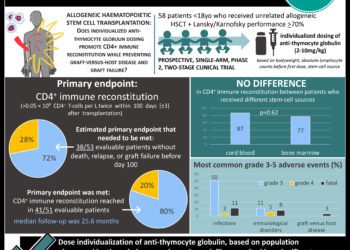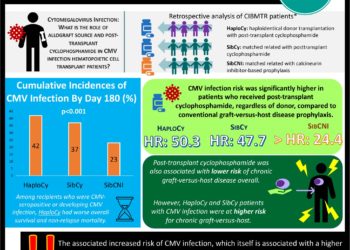Quick Take: Factors associated with successful discontinuation of immune suppression after allogenic hematopoietic cell transplantation
1. Successful discontinuation of immune suppression after hematopoietic cell transplantation may be less likely in the setting of peripheral blood stem cell grafts, prior graft-versus-host disease, and earlier discontinuation efforts.
Evidence Rating Level: 2 (Good)
Unlike after solid organ transplantation, immune suppression discontinuation is commonly attempted after hematopoietic cell transplantation (HCT). The basis of this strategy lies in the thought that immune tolerance develops and earlier immune suppression discontinuation supports graft vs. cancer effects and decreases the risk of opportunistic infections. To date, however, little data is available on the rate of successful immune suppression discontinuation in this context. In this cohort study, 827 patients that had undergone allogeneic HCT were followed up to examine factors associated with successful immune suppression discontinuation and risk for immune suppression discontinuation failure. A total of 342 patients, 41.4% of the total study population, were able to stop immune suppression. However, 127 of these patients (37.1%) resumed immune suppression for treatment of graft-versus-host disease (GVHD). Factors associated with a decreased odds of immune suppression discontinuation included older receipt age (OR 0.27, 99% CI 0.14 to 0.50 for age >50 years vs. <30 years), mismatched unrelated donor (OR 0.37, 99% CI 0.14 to 0.97, p=0.008), peripheral blood graft vs. bone marrow graft (OR 0.46, 99% CI 0.26 to 0.82, p<0.001), and advanced stage of disease (OR 0.45, 99% CI 0.23 to 0.86, p=0.002). Failed attempts at immune suppression discontinuation resulting in GVHD was found to be associated with the use of peripheral blood stem cells (HR 2.62, 99% CI 1.30 to 5.29, p<0.001), prior GVHD, and earlier immune suppression discontinuation attempts. Of note, earlier discontinuation was not associated with decreased cancer relapse after transplantation (HR 1.95, 99% CI 0.88 to 4.31). This study therefore shows that successful discontinuation of immune suppression may be less likely in the setting of peripheral blood stem cell grafts, and that earlier attempts at discontinuation may not confer any long-term benefit with respect cancer relapse. This study has important implications in the identification of patients likely to succeed or not in discontinuation of immune suppression.
Click to read the study in JAMA Oncology
Image: PD
©2019 2 Minute Medicine, Inc. All rights reserved. No works may be reproduced without expressed written consent from 2 Minute Medicine, Inc. Inquire about licensing here. No article should be construed as medical advice and is not intended as such by the authors or by 2 Minute Medicine, Inc.







